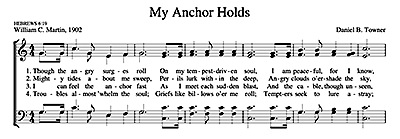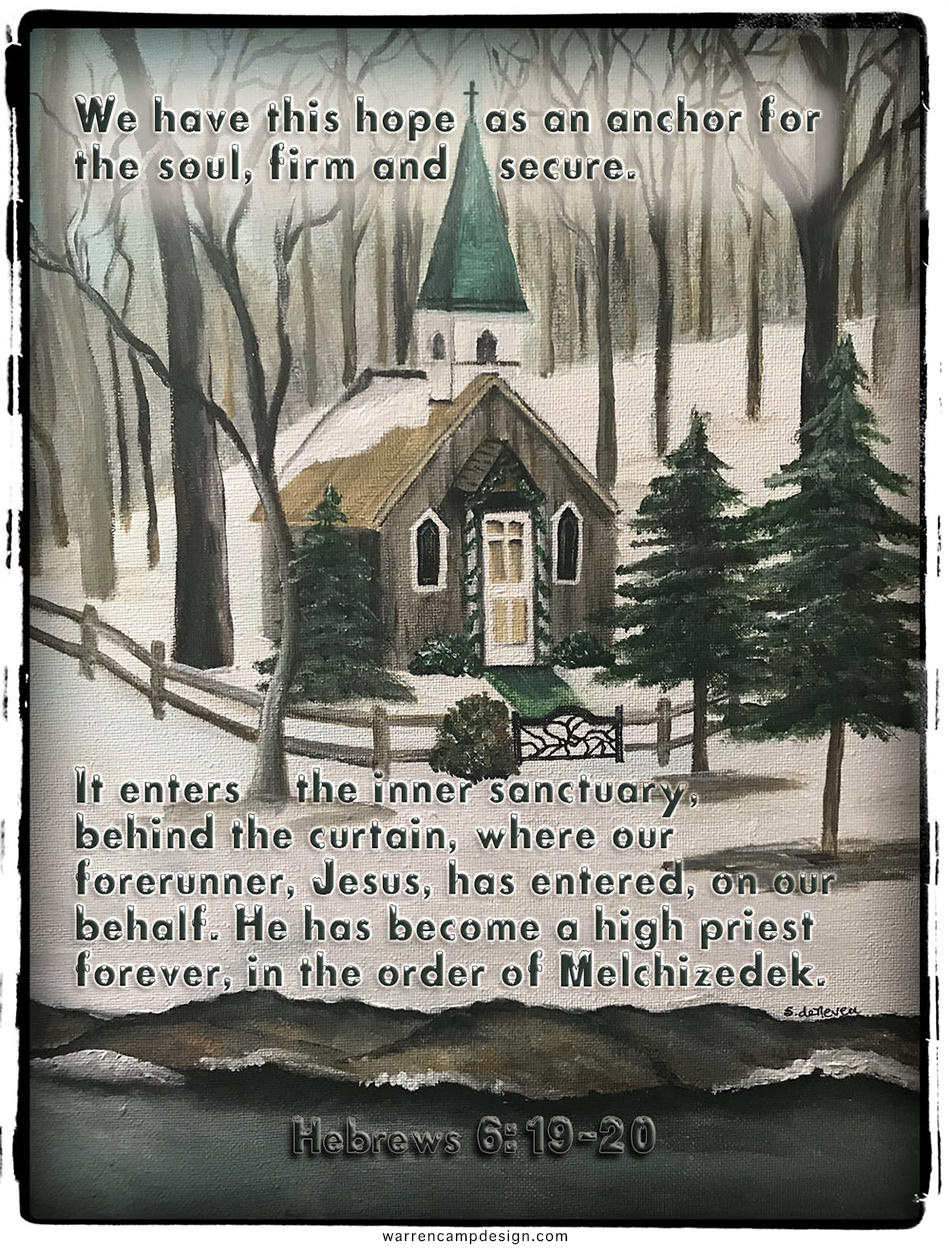Hebrews 6:13–20 . . .
“God’s Promises Are Guaranteed”
We saw in our previous summary that, if the "Hebrews" audience didn't progress in their Christian life, they'd regress to a state in which there'd be hardness of heart and little chance of repentance. If this happened, they'd suffer the loss of heavenly rewards they might receive when they'll stand in front of Christ's judgment seat. But, our author called out to them: "Don't be discouraged!" He exhorted them to be diligent in their faith and follow the example of Old Testament saints. In today's passage, he'll drive home his point by reminding them of the faith of Abraham who received many of Father God's promises.
The author of "Hebrews" has already shown why he had confidence in his audience of Jewish-Christian believers, namely, because of the good deeds they'd performed (6:10). Herein he'll show similar conviction because of the biblical promises or oaths made to the patriarchs. Hence, he'll do two things: first, he'll declare God's promise to Abraham; second, he'll state in v. 16 why he was certain of the Father's promise to Abraham. In regard to God's promise, he'll do three things: (1) he'll highlight to whom God had made this promise; (2) he'll demonstrate that the manner in which the oath had been made was suitable (v. 13b); and (3) document the resulting effect of the promise (v. 15).
In prior passages, the writer had issued a warning originally meant for persecuted Jewish Christians, however, the warning is relevant to all believers today: Christians who remain spiritually immature run the risk of falling to worldly pressures to compromise their faith, which results in God's judgment. Today's passage explains why Christians can have such a strong confidence in their faith, even when their situation appears dire. Abraham is used as a key example of patient faith.
You Can Rely on God’s Promises (6:13–15)
Common sense teaches us that the contractual or verbal agreements into which we enter are only as good as the integrity of the parties making them. The writer here outlined the assurance that would allow Christians, then and today, to grow in their faith, despite persecution. With Abraham being the prime example, these first three verses assure Jewish Christians that they have the ultimate source of confident hope: the perfect, high priesthood of Jesus Christ.
The Certainty of God’s Promise
13When God made his promise to Abraham, since there was no one greater for him to swear by, he swore by himself, 14saying, “I will surely bless you and give you many descendants” [quoted from Genesis 22:17]. 15And so after waiting patiently, Abraham received what was promised (6:13–15).
When God confirmed his covenant with Abraham with a promise, he indicated to him that this was an unconditional covenant. God promised Abraham so that he and his descendants would know assuredly that God's promises to him would definitely be fulfilled. Nothing would prevent such fulfillment.
In all cases, we need to be sure that the person who makes a promise really means it. In God's case, all of his promises are grounded in an unchanging, perfect Creator who cannot lie. Subsequent verses in this passage reveal that God's perfect and holy Word, and his perfect nature, work together to guarantee all that he promises us. Christians, today, can reliably pursue growth in their faith, even when feeling persecuted, because our hope is secured and made fast in Jesus Christ.
God’s historic oath-making reflects his character. Because he doesn't lie (v. 18), what he promised Abraham and Sarah was fulfilled in the exodus. The phrase "swore by himself" recalls God’s final promise of a great nation, in response to Abraham’s willingness to sacrifice his son Isaac. God made a number of promises to Abraham on several occasions. The one that we find in v. 14 is from Gen. 22:17. On that occasion, God emphasized his words very strongly by using an oath, which is a very serious declaration that guarantees one's promises. God always carries out his promises, even without an oath. But for some very important promises, God intentionally used oaths. Nobody is greater than God! That's why God had witnessed his own oath; he wanted to make it very clear that his promise was certain.
Herein we see that confidence is crucial. Those stuck in spiritual immaturity were wrestling with doubts and fears about fundamental Christian doctrines. To move beyond that shallow grasp of truth, and its danger, it was essential for them to have assurance, confidence, and trust in what God had promised. The author was apparently concerned that whatever confidence his readers might have had, it might have been wearing thin. For the early church's Jewish Christians, there would have been no better example of a person with a confident level of faith than Abraham.
Abraham’s act of obedience to God is a fabulous example of "faith and patience" (6:12) for all Christians who "may be greatly encouraged" (v. 18) because of God's promise to Abraham. John Calvin said this about such "faith and patience": "What this means is a firm faith, which has patience as its companion. For faith is what is chiefly required; but as many who make at first a marvelous display of faith soon fail, he shows that the true evidence of that faith, which is not fleeting and [disappearing], is endurance. By saying that the promises were obtained by faith, he takes away the notion of merits; and still more clearly by saying, that they came by inheritance; for we are in no other way made heirs but by the right of adoption."
After focusing on "faith with patience" in our previous commentary, we again see the importance in v. 15 of "waiting patiently," just as their faithful and patient patriarch, Abraham, had waited a long time to see God's promises fulfilled (Gen. 12:7; 17:5; 18:18; 22:16–18). In some cases, God didn't completely fulfill those Abrahamic promises until after his death. But God came through for him, sealing his promise to him with an oath. It was because Father God could swear by no one greater, he swore by himself. This specific oath showed that God’s promises are reliable and unchanging. Abraham’s trust in this was his passport to the fulfillment of God's promise.
So, where does God's fulfilled promise to Abraham fit into our current discussion of "Hebrews"? Aaron's priesthood was temporary and earthly, while Melchizedek's priesthood was permanent and heavenly. That's why, under the Aaronic priesthood, repeated sacrifices were required until Christ's death and resurrection, after which only one permanent sacrifice was needed, thanks to Christ — the high priest of the Melchizedek order of priests. The steadfastness of God's oath makes salvation permanent in believers. These three verses confirm our understanding of vv. 4–6 in that salvation through Christ is presented here as permanent and unchangeable.
What God Wanted to Make Very Clear (vv. 16–18)
An oath is a serious declaration that one’s words are true. We know that all of God’s words are true; he never lies; he does everything he promises. But we sometimes find it hard to trust him, which is why God has used oaths.
16People swear by someone greater than themselves, and the oath confirms what is said and puts an end to all argument. 17Because God wanted to make the unchanging nature of his purpose very clear to the heirs of what was promised, he confirmed it with an oath. 18God did this so that, by two unchangeable things in which it is impossible for God to lie, we who have fled to take hold of the hope set before us may be greatly encouraged (6:16–18).
The word "swear" (Greek omnuo) means to affirm the truth of a statement by calling on a divine being to execute sanctions against a person if the statement in question isn't true; in the case of a deity taking an oath, a divine being is One who validates the statement. In this case, God's own divine being is regarded as being the One validating the statement.
This is a glorious truth. When men are involved in strife and want to make peace and guarantee that peace, they do it by doing two things: (1) They keep the peace and (2) they swear or take an oath that they'll fulfill their promise. And note: They always swear by someone or something greater than themselves. When they make such an oath, it settles any dispute. They do what they say!
In v. 18 he refers to "two unchangeable things." What might they be? Well, the first is God's promise made to Abraham, the Abrahamic Covenant (vv. 13–17). The second is the fulfillment of God's promise through Jesus Christ, a priest forever, after the order of Melchizedek (vv. 19–20). Both "unchangeable things" are fulfilled in and by Jesus. They are the basis for our salvation, sanctification, and eternal security. How much more secure could our salvation be?
John Calvin said this about v. 18's "two unchangeable/immutable things": "What God says, as well as what he swears, is immutable (see Psalm 12:6; Numbers 23:19). With men it may be far otherwise; for their vanity is such that there cannot be much firmness in their word. But the word of God is in various ways extolled; it is pure, without any dross, like gold, seven times purified… The word of God, then, is a sure truth (Greek αὐτόπιστος, self-worthy of trust.) But when an oath is added, it is an [overabundance] added to an already full measure. We have, then, this strong consolation: God, who cannot deceive when he speaks, being not content with making a promise, has confirmed it by an oath."
Apparently, the author has used this Old Testament imagery to illustrate the safety and security that only Christ offers as the Great High Priest, to whom we Christians can flee for our safety. The believer latches onto Jesus by faith; it's in Christ that the believer finds safety. And, since High Priest Jesus lives forever, we can always find refuge and safety in him.
Verse 18 speaks of "the hope set before us." What, specifically, is that hope? Pastor Ray C Stedman says, “It is the Melchizedek ministry of Jesus,” as vv. 19–20 make clear. He has already entered heaven on our behalf and stands ready as a great high priest to impart comfort, strength, forgiveness, love, joy, and peace to any who flee to him for refuge in time of trouble. Like an anchor that holds a boat steady amid a storm, he can sustain and steady us when we are battered and beaten by life. He can do this forever since he’s not an Aaronic priest who can only minister for one lifetime, but a priest, after the order of Melchizedek, who ministers with the power of an endless life!
Believers have a hope that anchors their soul. Our relationship with Jesus brings us close to the thrown of heaven where we can cast our burdens before an omnipotent God. We can cling to him through any trial that comes our way. Because of the Lord's great love, he provides strength for weary bodies, peace for anxious minds, and comfort for grieving hearts. In short, he calms our storms and tenderly guides us through trying situations.
Hope: The Soul’s Anchor (vv. 19–20)
While continuing to describe the safety and security that Christ the Great High Priest furnishes to Christians, the author now uses different imagery, that of an anchor. It's used here, no doubt, because of what we've already read and appreciated in 2:1-3. That's why 𝄞 "My Anchor Holds . . . But in Christ I can be bold, I’ve an anchor that shall hold."
Anchors don't always work, based on where they lie. Some touch only the surface of the rocks in the sea. But Jesus did a much-better anchoring job by providing a strong connection to God, which isn't a mere surface connection. Our connection with Father God reaches deeply into the most holy place wherein we find God. We can be sure that our anchored connection is secure because Jesus went beyond the curtain that separated that most holy place from the rest of the temple (God’s house, see 9:12).
Although people were forbidden to enter that holy inner sanctuary, only the high priest was allowed access to it through its curtain (9:7). Because Jesus is now our Great High Priest, the hope we Christians have is secure and certain — based not on limited human access or effort, but on Jesus’ perfect, prevailing work and presence before God.
19We have this hope as an anchor for the soul, firm and secure. It enters the inner sanctuary behind the curtain, 20where our forerunner, Jesus, has entered on our behalf. He has become a high priest forever, in the order of Melchizedek (6:19–20).
It should be very clear to see how an anchor prevents drifting. It was a common figure for hope in the ancient world. Here (v. 19a) the idea is that we're anchored to something firm but unseen. A confident hope in God’s covenant promises, which he made to Abraham and his descendants, which God guaranteed by his oath, can become our soul's anchor. There won't be any spiritual drifting when we cling confidently to Christ. That promise of divine blessing, made to Abraham under oath, by a God who doesn't lie, is the gold standard of a people’s hope — the "anchor for the soul" and our whole being. On our behalf, Jesus has entered the most holy inner sanctuary. Such a blessing easily motivates our advancement toward heaven.
"This hope . . . enters the inner sanctuary behind the curtain" speaks to a confident, anchor-like hope. It's what brings us into God's presence; it's the medicine that Christians take to treat anxiety, doubt, discouragement, so many more challenging conditions. Thankfully, v. 19b presents Jesus as the "forerunner" who's already entered the inner sanctuary — the holy of holies. His access into the presence of God is most assuring to believers. Old Testament high priests didn't enter the inner sanctuary as a forerunner on the peoples' behalf but only as their representative. Because Jesus entered into Father God's immediate presence, his people can follow him into that holy presence.
By now you know that this commentary includes at least forty instances of "promise." These promises are the basis of our hope and endurance, the prominent theme in "Hebrews." In fact, "promise," "promised," or "promises" occurs seventeen times in it, more frequently than in any other book of the Bible. [See all the verses in which these words appear.] Note: A promise-making God, whose faithfulness never falters and whose truth-telling never wavers, guarantees our inheritance. Jesus, the exalted Son who knows the way and has already entered heaven, has done so "on our behalf" (v. 20). He continues to provide pastoral care and directions during our wilderness journey; he's our "high priest forever, in the order of Melchizedek." The practical importance of our author’s claim will be presented in the next few chapters, so stay tuned.
In conclusion, the author of "Hebrews" has shown in today's passage how God’s covenant promises undergird and strengthen our hope, which then becomes the basis for our perseverance and endurance amid adversity. He's portrayed our faith as it enters the sanctuary in heaven where Jesus sits upon the throne and where we see and appreciate his mercy and grace so fully that we're held fast, seemingly by a divine anchor, safely enduring the beating waves of trouble and doubt. Held steady in the midst of trying circumstances, we grow in the certainty of our hope of glory. With his encouraging words of hope, he's introduced the grand theme of his epistle: the new priesthood, which operates on the basis of a new covenant that makes possible a fruitful life of faith in a faithless and hostile world.
Clearly, as we persevere, God provides further confidence for us in his promises; such confidence enhances our hope. All of this is God’s way of showing us that his promises are the basis for our perseverance. Therefore, it's really all about God, not about our works, deeds, or performance.
- Q. 1 Approximately how many promises has God made? Exactly how many has he failed to keep?
- Q. 2 What are the two unchangeable things about which God cannot lie?
Hebrews 6:13–20
New International Version (NIV) or view it in a different version by clicking here.
— Listen to chapter 6, narrated by Max McLean.





